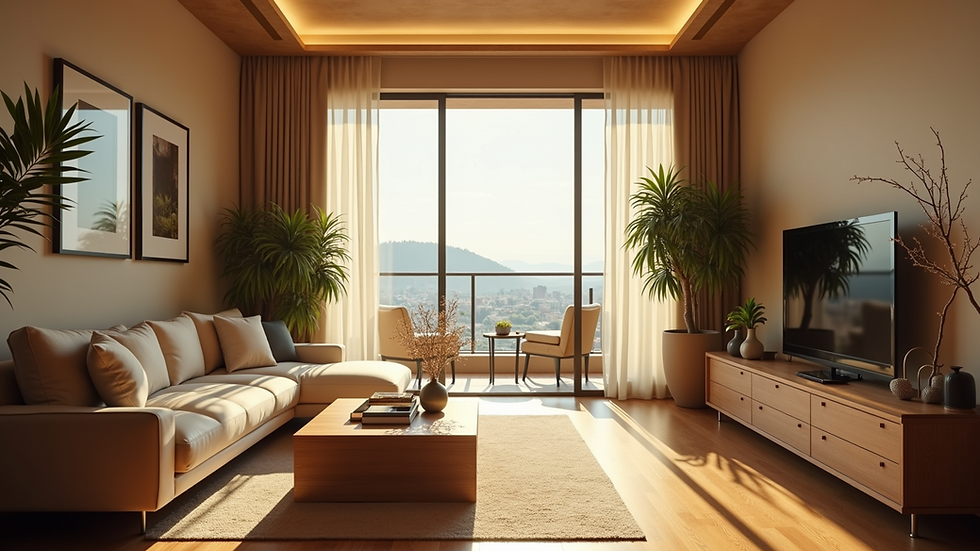How to Achieve Perfect Sound Quality in Your Living Room
- netmultimediaexper
- May 30, 2025
- 4 min read
Enjoying your favorite movies and music is a sensory experience that greatly depends on sound quality. Whether you’re binge-watching the latest series or throwing a party with your favorite playlist, having the right audio setup can elevate the experience. In this article, we will explore ways to achieve perfect sound quality in your living room, focusing on the benefits of a good surround sound system and how to optimize it for the best audio performance.
Understanding Surround Sound
Surround sound refers to a multi-channel audio system designed to create a three-dimensional sound environment. Instead of just hearing audio from two speakers, surround sound systems use multiple speakers placed around the room. This setup allows audio to come from different directions, mimicking how we naturally hear sounds in the real world.
The most common surround sound setups include 5.1 and 7.1 systems. The "5" in 5.1 refers to five speakers—left, right, center, and two rear speakers—while the ".1" indicates a subwoofer for low-frequency effects. A 7.1 system includes two additional surround speakers for an even richer audio experience.

Choosing the Right Speakers
The first step to achieving excellent sound quality is selecting the right speakers for your living room. Here are a few tips:
Speaker Types: There are several types of speakers to choose from, such as bookshelf, floor-standing, and satellite speakers. Floor-standing speakers typically produce better bass response, while bookshelf speakers are more compact and can fit into smaller spaces.
Material Quality: Pay attention to the materials used in the speaker design. Wooden cabinets produce better sound quality compared to plastic ones. Look for speakers made from MDF (Medium Density Fiberboard) or high-quality vinyl.
Power Handling: The power handling capability of your speakers must match the output power of your audio receiver. Look for speakers that can handle at least the wattage output of your amplifier.
Compatibility: Ensure that your speakers are compatible with your audio systems, such as AV receivers or soundbars.
Knowing the right specifications can often be the difference between an average sound experience and one that is immersive and enriching.

Optimizing Room Acoustics
Once you have your speakers, the next step is to optimize the acoustics of your living room. Often underestimated, room acoustics play a significant role in sound quality. Here are some tips for optimizing your living space:
Speaker Placement: The arrangement of your speakers can drastically affect sound quality. Ideally, the front left and right speakers should be spaced at ear level, forming a triangle with the listening position. The center speaker should be placed directly above or below your television, with surround speakers positioned at or slightly above ear level when seated.
Wall Treatments: Hard walls and surfaces can create echoes, muddying sound quality. Consider adding acoustic panels to absorb sound. Rugs can also help dampen sound reflections.
Furniture Arrangement: The layout of furniture can impact sound clarity. Avoid placing large pieces directly in front of speakers. Instead, create a clear path for sound to travel.
Subwoofer Location: The placement of your subwoofer can have a huge impact on bass response. Try different corners of the room to see where it sounds the best.
By paying attention to these details, you’ll vastly enhance your audio experience.
Integrating Technology for Enhanced Experience
In today's digital age, integrating technology can vastly improve sound quality. Here are some ideas to consider:
Streaming Services: Platforms like Tidal and Amazon Music offer high-resolution audio that provides a richer listening experience. Make sure your sound system can handle high-quality streaming.
Audio Calibration: Many modern home theater receivers come with built-in calibration tools. These tools use microphones to analyze room acoustics and adjust speaker settings accordingly.
Smart Home Integration: Consider integrating your audio system into a smart home setup. This allows for easy control over audio settings, as well as integration with smart assistants for voice control.
Wireless Speakers: If you're limited by wiring, consider using wireless surround sound speakers. They can offer flexibility in placement and can still deliver high-quality audio.

Maintaining Your Audio System
Maintaining your audio system is essential for preserving sound quality. Here are some tips to keep in mind:
Regular Cleaning: Dust and dirt can damage audio equipment. Regularly clean your speakers with a soft, dry cloth, and ensure connections are dust-free.
Check Connections: Loose or corroded connections can lead to degraded sound quality. Periodically check all cables and connections to make sure they are secure.
Software Updates: For systems with digital components, such as streaming services or smart home integrations, keep your software updated to ensure optimal performance.
Avoid Overdriving: Playing music or films at maximum volume for extended periods can damage your speakers. Know the limits of your equipment and avoid pushing them too hard.
Creating an immersive audio experience isn't just about the initial setup; it's about long-term care and maintenance as well.
Final Thoughts on Achieving Perfect Sound Quality
Investing time and resources into achieving perfect sound quality in your living room can dramatically enhance your audio experiences, whether for cinematic adventures or just relaxing with a favorite album. By understanding the intricacies of surround sound, choosing the right equipment, optimizing your room's acoustics, and maintaining your system, you'll be well on your way to enjoying exceptional audio experiences.
For those curious about an effective surround sound setup, be sure to explore resources and specialists who can guide you in creating a bespoke system tailored to your needs. The journey to audio perfection is an ongoing one, and every step counts toward enhancing your listening experience.
Contact Net Multimedia Experts 630.541.9000





Comments